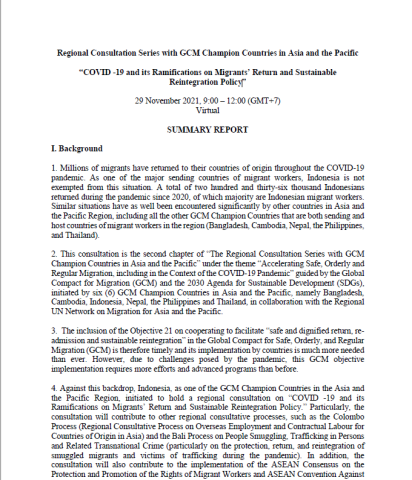Library
Summary Report – Regional Consultation on COVID -19 and its Ramifications on Migrants’ Return and Sustainable Reintegration Policy
On 29th November 2021, The Ministry of Foreign Affairs of the Republic of Indonesia, in collaboration with the Regional UN Network on Migration for Asia and the Pacific, organized the second GCM Champion Series regional consultation on “COVID -19 and its Ramifications on Migrants’ Return and Sustainable Reintegration Policy”. Champion Countries, stakeholders, and UN agencies from the region discussed good practices, challenges, and ways to advance GCM objective 21 on cooperating to facilitate “safe and dignified return, re-admission and sustainable reintegration”, aligned with SDGs 3 (good health and well-being), 5 (gender equality), 8 (decent work and economic growth), 10 (reduced inequalities) and 17 (partnerships for the goals). Approximately 200 participants came together to produce a set of recommendations for countries to ensure safe and dignified return, readmission, and reintegration mechanisms for migrants that can be applied to crises beyond the COVID-19 pandemic. In addition, the consultation’s theme further highlights Indonesia’s best practice for migrant worker returnees’ economic reintegration under the DESMIGRATIF Program (Productive Migrant Villages), which builds capacity and protects Indonesian migrant workers originating from rural areas. The DESMIGRATIF program provides entrepreneurship training at the local level and focuses on savings, loans, and business development support, financing for worker deployment, multi-business, migrant workers’ financing, and remittances. This program has contributed to economic development and reduced push factors of irregular migration, which can be replicated by other champions.
